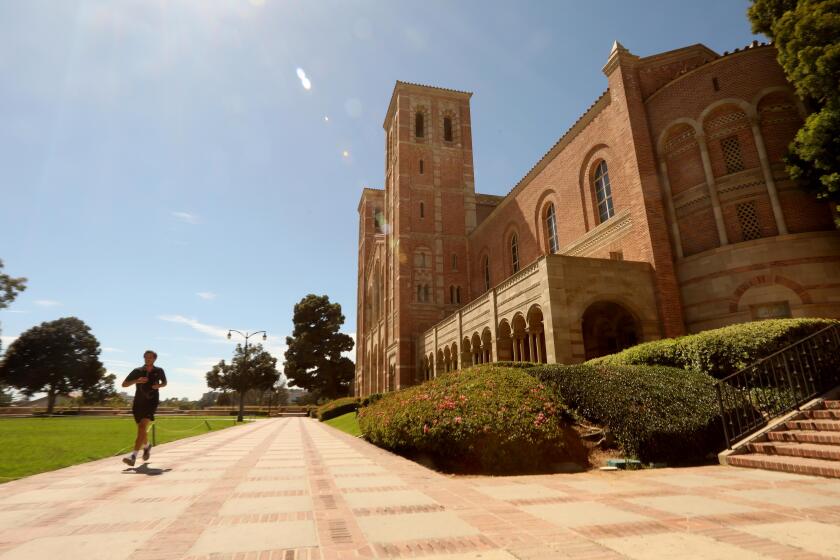O.C. Case Paves Way for Surprise Sobriety Stops
SAN FRANCISCO â In a decision that comes as a warning to overindulgent holiday revelers, the California Supreme Court said Thursday that police need not provide advance publicity about roadblocks set up to catch drunk drivers.
Ruling in an Orange County case, the court concluded in a 5-2 decision that establishing sobriety checkpoints without alerting motorists is not unduly intrusive under the U.S. Constitution.
âAlthough publicizing in advance the location of a sobriety checkpoint may serve to minimize the surprise or inconvenience experienced by motorists,â a warning is not necessary for such checkpoints to be reasonable, Justice Ronald George wrote for the court.
If police were forced to issue warnings, George noted, it would create an onerous burden for authorities, perhaps requiring them to give notice in multiple languages and leading to âthe uneven application of advance-publicity rulesâ around the state.
Law enforcement officials applauded the decision, saying it will give police new flexibility in deciding how to structure checkpoints to best suit their citiesâ needs.
âIâm pleased because now we wonât be stuck with a cookbook formula on how to run these,â said Orange County Deputy Dist. Atty. Gregory Robischon, who argued the case before the court.
But Orange County Deputy Public Defender Alan J. Crivaro called the decision disappointing, saying that the 4th Amendment rights of innocent motorists are violated by surprise stops.
âThe 4th Amendment stands for the very basic freedom of citizens to be free of government intervention in their lives,â Crivaro said. âThese field sobriety checks are government intervention in our lives. They are really quite intrusive.â
Crivaro expressed hope that police will continue to publicize checkpoints, arguing that âthe public education aspect of the roadblock is where the benefit of the roadblock--if any--lies.â
Robischon predicted that some publicity would continue, noting that warnings âcan have a deterrent effectâ by discouraging drivers from having one drink too many.
Roadblocks became popular in California in the wake of a 1987 state Supreme Court decision that permitted police to detain motorists to check for signs of intoxication without the suspicion of wrongdoing that is typically required for a traffic stop.
The court said then that so long as checkpoints are operated according to certain guidelines, any invasion of motoristsâ rights is outweighed and justified by the publicâs need to deter drunk driving.
Under the guidelines established by the court, police were encouraged to make checkpoints well lit and clearly marked and to stop cars briefly and at random--every fifth car, for example. Another guideline said that advance publicity âreduces the intrusiveness of the stopâ and the âsurprise, fear and inconvenienceâ of drivers.
But the court said Thursday that its advance publicity guideline was merely that--and not a requirement. Citing a 1990 U.S. Supreme Court decision that rejected a constitutional challenge to roadblocks in Michigan, the majority said publicity remains relevant to the legality of a checkpoint but is not absolutely required.
Huntington Beach Sgt. Tris Swan, who coordinated that cityâs 18 sobriety checkpoints this year, said the court ruling will make checkpoints more effective.
âThere will be more of a surprise element now for those out on the street, because we wonât have to send out the advance notification,â Swan said. âPeople wonât know where weâll be.â
But officials from many Orange County law enforcement agencies said they will continue to advertise future checkpoints.
The ruling âreally wonât have a positive or negative impact,â said Garden Grove Police Capt. Scott Jordan, who supervises the traffic department. âWe use (roadblocks) more as a deterrent and education tool, not as an arrest machine. Even though we do make arrests, the purpose of sobriety checkpoints is to get the word to the public that the abuse of alcohol will only lead to injuries and deaths.â
Huntington Beach Police Chief Ronald E. Lowenberg said he was âecstaticâ with the ruling.
âI think the whole issue of drinking and driving is still a significant problem, and itâs kind of ironic that this came during this holiday season,â Lowenberg said. Yet, as encouraging as the ruling is for law enforcement, the chief added, âfolks will still choose to drink and drive.â
Thursdayâs decision stemmed from the drunk driving conviction of Mary Louise Banks, who was arrested at a checkpoint on Pacific Coast Highway in Seal Beach in 1990. Banks appealed, arguing that the checkpoint was illegal because it was not announced.
Last year, an appellate court agreed, overturning her conviction and ruling that publicized warnings were a required element for checkpoints. The high courtâs decision Thursday reinstated the conviction.
Justices Edward Panelli and Stanley Mosk dissented.
In a related case, the court ruled 4 to 3 that a driver whose drunk driving arrest is ruled illegal in a criminal prosecution can still face a license suspension from the state Department of Motor Vehicles. Atty. Gen. Dan Lungren called the decision âa significant victory for California, just in time for the holidays.â
In 1992, 1,832 people were killed in alcohol-related collisions in California, down 13% from 1991.
Also Thursday, the court reversed the murder conviction and death penalty sentence of an El Dorado County man found to have received defective assistance from his attorney.
The action is noteworthy, experts said, because it marks the courtâs first reversal of a death penalty conviction this year. During the last three years, the high court has affirmed 95% of the death penalty appeals it has reviewed.
Times staff writers Lily Dizon and Greg Hernandez in Orange County contributed to this story.
More to Read
Sign up for Essential California
The most important California stories and recommendations in your inbox every morning.
You may occasionally receive promotional content from the Los Angeles Times.










